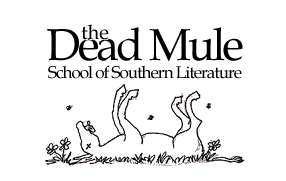Insufferable Horntooting
On Facebook the other day Valerie MacEwan, the founder and editor of the Dead Mule reached out to me with an incredibly nice note. She wrote, “We love Submittable and could not begin to imagine life without it. Thank you so much for all you’ve done for online publishing.” I was driving around Glacier National Park with my wife and kids when I read it. Cell connection was spotty. I quickly typed a reply before the car started ascending the Going-To-The-Sun Road, thanking her and telling her she had made my weekend, which, to be honest wasn’t very honest, because after a few dips in Lake McDonald, the weekend had been pretty much made.
Soon my battery died, and I was offline for the next 48 hours. When I got home on Monday, she had followed up with this:
“Quite honestly, I’d have stopped publishing the Mule, or just doing quarterly issues, without it. I mean, who else publishes the same journal for 17 years? No one would have blamed me for giving it all up.
We pay for it ourselves because we believe in it … and the gmail process really weighed me down. It was so hard to respond and keep track and writers didn’t know what was up and they’d email over and over again — because, let’s face it, we writers want to know NOW if we’ll be accepted.
But the best thing about Submittable, in all seriousness, is the ability to say “no” to someone. That was the worst thing for me, I just couldn’t bear to have a rejection email because it was always at the end of a series of conversations, it was too personal. I know what “no” feels like it. With Submittable, it’s more businesslike but I give it a personal response, no template only response, I add to it.
I love this little journal of mine. It really hit me how much Submittable has done for it when I started trying to figure out the 100 stories we’d publish in the first Anthology we’re trying to do. I have 10 years before Submittable and it’s all over the place … in backups on half-dead computers, in 10 year old software that’s half gibberish and half story … and then the angels sing and I get to have Submittable archives.
…I sincerely would have stopped publishing the Mule without you.”
The Dead Mule has been publishing online for 17 years. Valerie doesn’t pay herself and works hard to pay her authors, but mostly she is driven by the selfless satisfaction of finding and connecting the voices of strangers with readers.
Independent Publishers as Antifragile

Also, over the weekend, between incredibly gratifying FB messages and swimming with my kids in glacial lakes, I read a book called Antifragile by Nassim Nicholas Taleb.1 The main thesis of the book is that “durable” isn’t the opposite of “fragile.” Durable just means something is difficult to break. The opposite of fragile doesn’t exist, so Taleb was creating the term: antifragile. Something is antifragile if it becomes better under duress or in chaos. (My wife wants me to point out what a “terrible, terrible word” antifragile is.) But imagine a package with the sticker “Antifragile- Please Kick Around” on it. The more the box gets kicked around, the stronger the contents become. Not rocket-science, nor particularly revolutionary. Nietzsche said something along these lines a while back. But the idea is fun and especially attractive to undertakings outside corporate America. In a sort of self-congratulatory way, the book suggests artisan and start-up businesses and people are in a much better position than those in large corporate businesses. Taleb argues that ‘safe’ corporate jobs are actually fragile or very unsafe because big companies break easily from inevitable Black Swans, and the longtime employees of these companies are more screwed than their independent peers because the minute there are layoffs, their niche corporate skill sets are useless.
While my father, my 401K, and my bank account vigorously disagree that having a corporate or at least a university job wouldn’t be a good thing, reading something that suggest people outside corporate America aren’t complete jackasses felt nice. The book also made me think about Independent Publishing and, well, our customers, people like Valerie MacEwan. In my limited understanding, Independent Publishing has grown in the chaos of the last 10 years. (Out of our 6000 clients, nearly 2000 are independent publishers or blogs who didn’t exist prior to 2005.) While I’m not someone who thinks the Big Five publishers are particularly “commercial”2, I do feel they’ve spent a good part of the last decade hiding under their desks as Amazon and Apple randomly fling molten lava down upon them. I don’t think it’s anyone’s fault or, as some have suggested, because they’re blind to Amazon throwing molten lava down upon them. They’re just large companies. Like any large entity, they have an insanely hard time changing direction or weening themselves from legacy revenue models. Ultimately, there seem to be two specific problems for the Big Five: 1) their business model is built on the no-longer-true premise that creating and distributing words is difficult and expensive. 2) Amazon.
So the Big Five are kind of screwed until they figure out their new value proposition, lessen the control Amazon and Apple have over their bottom-line, and/or dramatically lower their costs by using amazing platforms like Submittable. 
On the other hand, as the Big Five try to figure out new business models, independent publishers like Valerie with little or no overhead are growing. After 17 years of online-only publishing, Dead Mule has begun actually PUBLISHING BOOKS! Independent publishers can do this because they’re agile and have little overhead. In this way, they’re much like start-ups. They can iterate. They can survive on fumes. They can dodge Black Swans (Amazon is a Black Swan for the Big Five, but not so much for small publishers). They can easily try out new platforms with funny names like Submishmash. And as someone who has 1000’s as clients, I can attest, they can be very lean with expenses! But most importantly, like start-ups, small publishers survive because, in a way, they barely exist until the one day when they’re winning the National Book Award. You can’t kill something that doesn’t exist. They are truly antifragile.
We Have the Best Clients in the World
Is it all roses for small publishers? No. Like start-ups, it’s not easy. The failure rate will be high even for indies who garner some success. But what has the chaos of publishing brought us in the last 10 years? McSweeney’s seemed like an art project until it was suddenly a mainstay for the National Magazine Awards. For years when I thought of Graywolf or Coffee House, I thought “Minnesota” (no offense, I’m from Rochester). Now I think “publishers of Nobel Prize winners.” In 2010, the Pulitzer Prize went to a book called Tinkers which was published by Bellevue Literary Press, which refers to itself as “a project of the New York University School of Medicine.” The founders of Electric Literature with their 150,000 followers on Twitter are regularly on national television discussing their latest projects. Publishers like DZANC have begun buying up epub back lists and distributing them themselves and publishing 20th Century giants like Robert Coover. And, Mamalode, our very first client ever, has been named the Best Parenting Magazine of the Year. I could go on. Not roses, but pretty amazing.
I would miss the NYC publishing world if it went away. Some of them are clients, so I’d miss them in that palpable bottom-line sense, but I would mostly miss the illusion of a certain glamour it suggests for young writers. Still I don’t for a second feel that literature would suffer. The wonderful books they publish would instantly find new channels. As Richard Nash wrote in the Virginia Quarterly Review, in one of the best essays ever on the business of literature, “what we have right now is a system that produces great literature in spite of itself.”
Submittable works hard to be antifragile as well. Feels like a bit of a rocket ship right now, but for those first few years it was just 3 of us working 20 hours a day for no or little pay. We went for months on pure delusion. Being based in Missoula, MT, geographically and mentally as far from NY publishing as you could get, I think helped us to think slightly outside the box and work as if everyday is a Black Swan. As a co-founder, I’m obviously concerned about our customers. Our success is tied directly to theirs. When we raised money last year, I was laughed out of a few investor meetings after mentioning some of our clients. MBAs and people who do truly know better have repeatedly told me we need different customers because publishers are all going broke. But as we’ve grown, and as our customers like Valerie grow, it’s become more and more apparent that thousands of smart, articulate, antifragile clients are more than any start-up could hope for. We’re grateful, and thrilled for what comes next. Thank you.
-MF
- I’m not recommending the book. It’s all over the place and could have used an editor. Here are three books I’m recommending: The Good Nurse, Glorious Misadventures, and I Don’t Know I Said [
]
- No one goes into publishing, commercial, academic, or independent, to make money. Anyone who thinks editors do it for the money is incredibly naive. [
]

